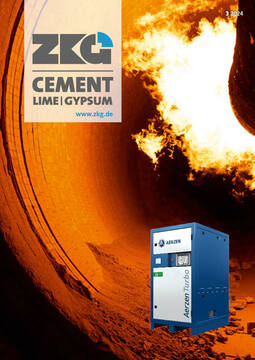Globally unique pilot plant inaugurated
On 12 April 2024, in the presence of the Thuringian Minister of Economics and Science Wolfgang Tiefensee and numerous other guests, a globally unique pilot plant for the production of low-CO2 cement additives was inaugurated at the Institute for Applied Construction Research (IAB) in Weimar.
The main task of the new Flash Calciner with Color Control is the thermal treatment of powdery materials, whereby these can be heated to temperatures of up to 1000 °C. The special feature of the new pilot plant is the calcination of, for example, clay-like materials in a low-oxygen atmosphere, known as black firing. This makes it possible to change the color of the material (color change process) from reddish clay to a gray to white additive. As a result, calcined clay materials can be used as a substitute for cement in concrete production while maintaining the quality of fair-faced concrete, as the concrete is prevented from turning red.
“In order to achieve the EU’s climate targets, sustainable, energy-reduced solutions in the production, use and reuse of building materials and components are essential. The aim must be to transform the construction industry into a circular economy in the long term,” says IAB Director Dr Ulrich Palzer, describing the current challenges.
“In Germany alone, a good 30 million t of concrete are used every year, and around 20 million t of CO2 are generated in the production of the cement used as a binding agent. These figures alone illustrate how high the potential is to save CO2 in the construction sector - which also pays off economically. In view of the rising price of CO2 certificates in European emissions trading, it is crucial to strengthen resource management skills in the long term in order to decouple future economic growth from resource consumption. The Flash Calciner makes an important contribution to this,” said Science Minister Wolfgang Tiefensee.
The additives for cement production calcined in the new pilot plant will help to drastically reduce carbon dioxide emissions in concrete production in the future. “There is still no alternative to concrete as a building material in many areas,” explains Head of Research Mirko Landmann. However, the reduction of climate-damaging carbon dioxide during production is urgently needed for the future of the concrete industry.
Tests at the IAB have already shown that a CO2-neutral concrete industry could be feasible. “With the new pilot plant, we are able to transfer previous laboratory-scale tests to an industrial scale,” says Landmann. Larger quantities of calcined clay can now be produced in the flash calciner, which can be used in the production of CO2-reduced cements.
“We would like to thank the Free State of Thuringia for making this acquisition possible with a total of € 999900, including funding from the European Regional Development Fund,” says Palzer. In conjunction with the existing rotary kiln pilot plant, the flash calciner offers the opportunity to strengthen Weimar as a technology location and to play a pioneering role in the development of innovative and CO2-reduced binding agents.
However, a fundamental change towards greater energy efficiency, resource conservation, climate and environmental protection is also necessary in other areas of the construction industry, as the construction sector, including building construction, causes the highest greenhouse gas emissions in Germany at around 40% and consumes large quantities of raw materials as an industry.
“In order to support the regional construction industry in this transformation, we are planning even closer cooperation at the Weimar site,” announces IAB Director Robert Fetter and adds: “We would like to bring together the expertise of the three research institutions at the Weimar site - Bauhaus University (BUW), the Materials Research and Testing Institute (MFPA) and the Institute for Applied Construction Research (IAB) - from basic research to application for the implementation of joint projects.“
Prof. Carsten Könke, Scientific Director of the Materials Research and Testing Institute at the Bauhaus-Universität Weimar, highlights the advantages as follows: “The idea of stronger cooperation means that the entire research expertise of the three institutions can be used on the one hand and, on the other, duplication in the range of services can be reduced. For our regional construction industry, there will then be a scientific range of services from a single source that covers the entire development chain from basic research to industrial application.”
Building research has a long tradition and an excellent reputation in Weimar. The three institutions currently employ more than 300 experts in research, development and, above all, application. There is a close network, particularly with regional building materials and construction companies, architects and planners.
“If we make even greater use of synergies in the future, we can provide the regional construction industry with tools that will equip it very well for the necessary transition to a more sustainable industry,” says Prof. Peter Benz, President of the BUW, looking ahead. This will also make a significant contribution to securing Thuringia as a business and technology location.









